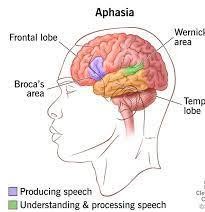A 45-year-old man on the neurology floor can understand instructions but is unable to express himself through talking. Which lobe of the brain controls the expression of speech?
Frontal lobe
Occipital lobe
Temporal lobe
Parietal lobe
The Correct Answer is A
Choice A rationale: The frontal lobe, specifically Broca's area located in the dominant hemisphere, is responsible for expressive speech. Damage to this area can result in expressive aphasia or difficulty expressing speech.
Choice B rationale: The occipital lobe primarily processes visual information.
Choice C rationale: The temporal lobe is involved in auditory processing and language comprehension.
Choice D rationale: The parietal lobe is involved in spatial perception, attention, and sensory information processing.
 |
Nursing Test Bank
Naxlex Comprehensive Predictor Exams
Related Questions
Correct Answer is D
Explanation
Choice A rationale: Gastrointestinal reflux disease is not typically a contraindication for sumatriptan.
Choice B rationale: Mild emphysema is not typically a contraindication for sumatriptan.
Choice C rationale: Hyperthyroidism is not typically a contraindication for sumatriptan.
Choice D rationale: Sumatriptan, a medication used for migraines, may elevate blood pressure, so it would be questionable for a client with hypertension.
Correct Answer is C
Explanation
Choice A rationale: The patient with type 2 diabetes admitted with pneumonia might not necessarily need insulin therapy to prevent ketoacidosis.
Choice B rationale: Type 2 diabetes doesn't typically involve islet cell antibodies destroying the pancreas's ability to produce insulin.
Choice C rationale: In this scenario, the patient might have enough endogenous insulin to prevent ketosis but could be at risk for hyperosmolar hyperglycemic syndrome due to illness-induced stress.
Choice D rationale: Type 2 diabetes often involves some degree of endogenous insulin secretion, and not all patients require daily insulin injections.
Whether you are a student looking to ace your exams or a practicing nurse seeking to enhance your expertise , our nursing education contents will empower you with the confidence and competence to make a difference in the lives of patients and become a respected leader in the healthcare field.
Visit Naxlex, invest in your future and unlock endless possibilities with our unparalleled nursing education contents today
Report Wrong Answer on the Current Question
Do you disagree with the answer? If yes, what is your expected answer? Explain.
Kindly be descriptive with the issue you are facing.
